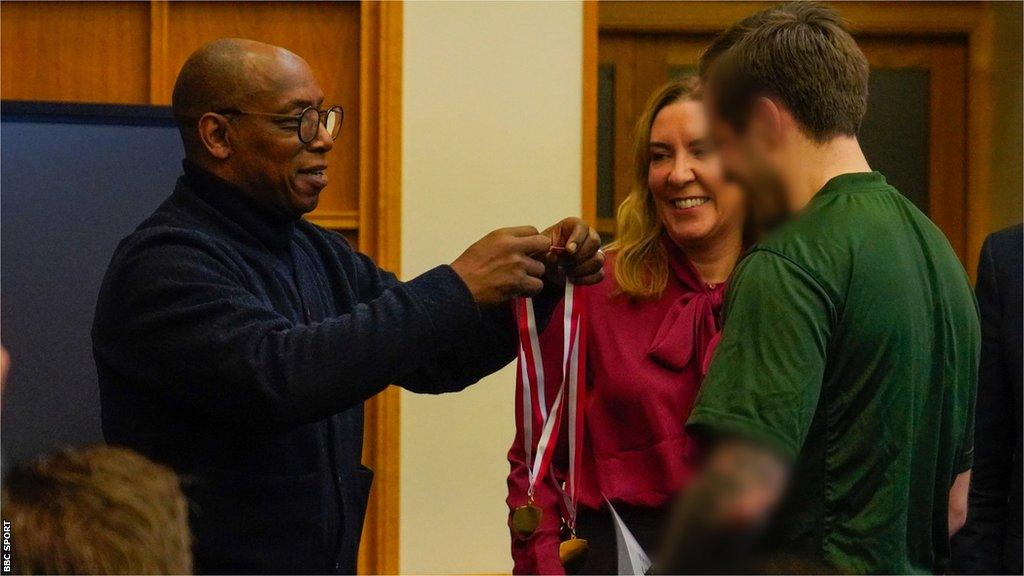Ian Wright: Former Arsenal striker on prison coaching scheme
- Published

Ian Wright watched the coaching sessions and then awarded out medals at North London's HMP Pentonville
"It changed my life because I knew that wasn't the life for me."
Ian Wright is visiting Pentonville Prison, just over a mile from Arsenal's Emirates Stadium and their former ground of Highbury, where the striker became a Gunners legend.
The former England player is reflecting on his own experiences of prison, when, aged 19, he was jailed for 32 days in Chelmsford Prison in 1982 for failing to pay fines and driving without a licence.
"Football saved my life," says 60-year-old Wright. "People say you've got to get yourself on the straight and narrow, but it's very hard, especially when you're in prison with nowhere to go."
Wright is at Pentonville to support the Twinning Project, a charity partnering football clubs with prisons to offer inmates a Football Association-accredited coaching qualification.
He hands out medals to 15 inmates, all graduates of a coaching course aimed at reducing reoffending.
Since 2018 the charity has paired professional teams with local prisons. The scheme, involves Chelsea, Manchester United and Everton among others, has run classes for almost 2,500 inmates.
Twinning Project founder is former Arsenal co-owner and vice-chairman David Dein, who signed Wright from Crystal Palace in 1991.
"We've now got 15 guys with a level one coaching badge," says Dein. "Hopefully when they come out they can progress.
"The key thing is every time we can stop an offender reoffending, the tax payer saves £50,000."
One of the graduates is Dane Satchwell, 38, a repeat offender who is currently in prison on drug offences.
He says: "The last time I came in I was young. I was 22; I came out at 26. Now I'm older - I'm 38 - it's a whole different mindset. You don't want to be in and out of prison like it's a revolving door.
"I've done other courses in prison but I've not done nothing like this."
Satchwell, who collected his certificate and medal from Wright, says he felt proud, but more importantly he hopes it makes his family proud.
Pentonville governor Ian Blakeman says: "Prisons can be difficult places. To get something that is out of the usual range of activities is really important - it gives people hope and optimism.
"We are really keen to get more activities because at the moment we don't always have enough."
Pentonville, a category B prison housing 1,200 inmates, has had a relationship with Arsenal since 2004, but the government wants more prisons and clubs working together to reduce rates of reoffending.
"I hope that the clubs see the benefits as well. It helps people make a positive choice in what to do with their lives," says Edward Argar, Minister of State for Prisons, Parole and Probation.
The final prisoner to be called to collect his certificate is Ashley O'Brien, who shakes hands with Wright and collects his Arsenal-themed medal.
"My dad's a Manchester United fan," O'Brien laughs. "I'm not sure he would be happy with me wearing this.
"I don't think I'm going to become a professional football manager, but say I'm in the park when I have a kid, I can transfer some skills. It's a good tool too have.
"A lot of people in prison say they are a product of their environment or that this is all they know, so learning something new, something different, it gives you options."

Our coverage of your Premier League club is bigger and better than ever before - follow your team and sign up for notifications in the BBC Sport app to make sure you never miss a moment
